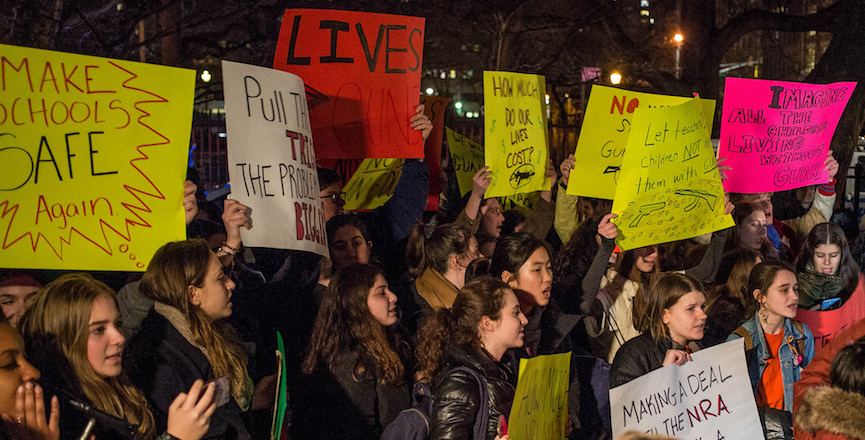It’s a relief to see some political action that isn’t built around elections. Politics should be about more than politicians running for office.
It happened in the U.S. this week with protests against guns by schoolkids, sometimes awfully young but also already too old. They say even if it doesn’t help them, they want their own kids not to feel fear each time they enter a classroom.
There was something sage, for instance, about one of the chants they chose: “Hey, hey NRA, how many kids did you kill today?” (Chants are retro but inexorably arise because they build unity in a shared cause.)
It’s a variation on the Vietnam-era, “Hey, hey LBJ, how many kids …” They knew the source and liked the link to a sort of golden oldie. It connected them to a tradition. And the update works because the kids killed by LBJ, the Vietnam-era president, were “collateral damage” in a larger war. The kids killed today are direct targets of the killers.
There’s also a charge in taking a stand “live,” as it were, versus online. I’m not saying “real” life is realer. The internet can be awfully real. But this is action with direct consequences and the sense of community is literally palpable.
The most venerable form of live protest is the strike (“Stand ye calm and resolute/Like a forest close and mute”) and it too has seen a revival. They’d almost vanished. From 1947 to 1981 in the U.S., large strikes numbered in the hundreds yearly. In recent years there’ve sometimes been five or seven.
But in West Virginia — a fiercely Republican state now with anti-union laws, where public sector strikes are illegal — 34,000 teachers struck last month, not just for money but the public good, and against the drift to private, “charter” schools. “I have a five-year-old son and I’m fighting for him,” said a union leader. They stayed out despite a “tentative” accord, till it was officially passed into law.
They, too, drew on traditions, regional ones like the “coal wars.” Now they strike in schools, not mines. They reached out and enlarged the issues. To assure their gains wouldn’t come at the cost of, say, medicaid, they called for tax hikes on corporations to pay for gains they made. There’s a nationwide strike in the UK at universities over pensions, and York University is out here.
Between protests and strikes I’m partial to strikes. They last longer so involve both ups and downs. Most large protest marches come and go on weekends. Strikes involve costs, like lost pay, as well as moments of delight. Mostly, as union leaders I worked with would say, they’re a kind of school. They teach workers how power works in our society, who you can count on, how to survive adversity, like being arrested, and keep going.
The great riddle is how to forge a link between often exhilarating events, such as protests or strikes — collective acts by ordinary citizens — and the electoral realm, where institutional power resides and change gets baked into laws. Obama had a unique chance to make this connection but he passed.
By the time he was elected in 2008, his team had the names of millions of activists and donors with the ability to organize “laterally,” who could’ve easily been empowered to work for causes of all kinds.
There was even a plan, called Movement 2.0. It had risks, such as opposition arising from “within” to bills like Obamacare in the name of universal care. So “party people” squashed 2.0 and turned it into the insipid change.gov, that merely solicited letters to congress along with job resumés. It was an assassination of citizen potential. Ironically, Republicans copied it to create the quasi-grassroots Tea Party instead.
Jefferson wrote that “the tree of liberty must be refreshed from time to time with the blood of patriots and tyrants. It is its natural manure.”
I’d prefer skipping the blood when possible, but I do think some fertilizing of the political process with occasional arrests, professional reprimands, detentions for classes skipped to go and protest outside, etc. — might be necessary, and also fun.
Image: Working Families Party/Flickr
Like this article? rabble is reader-supported journalism. Chip in to keep stories like these coming.




